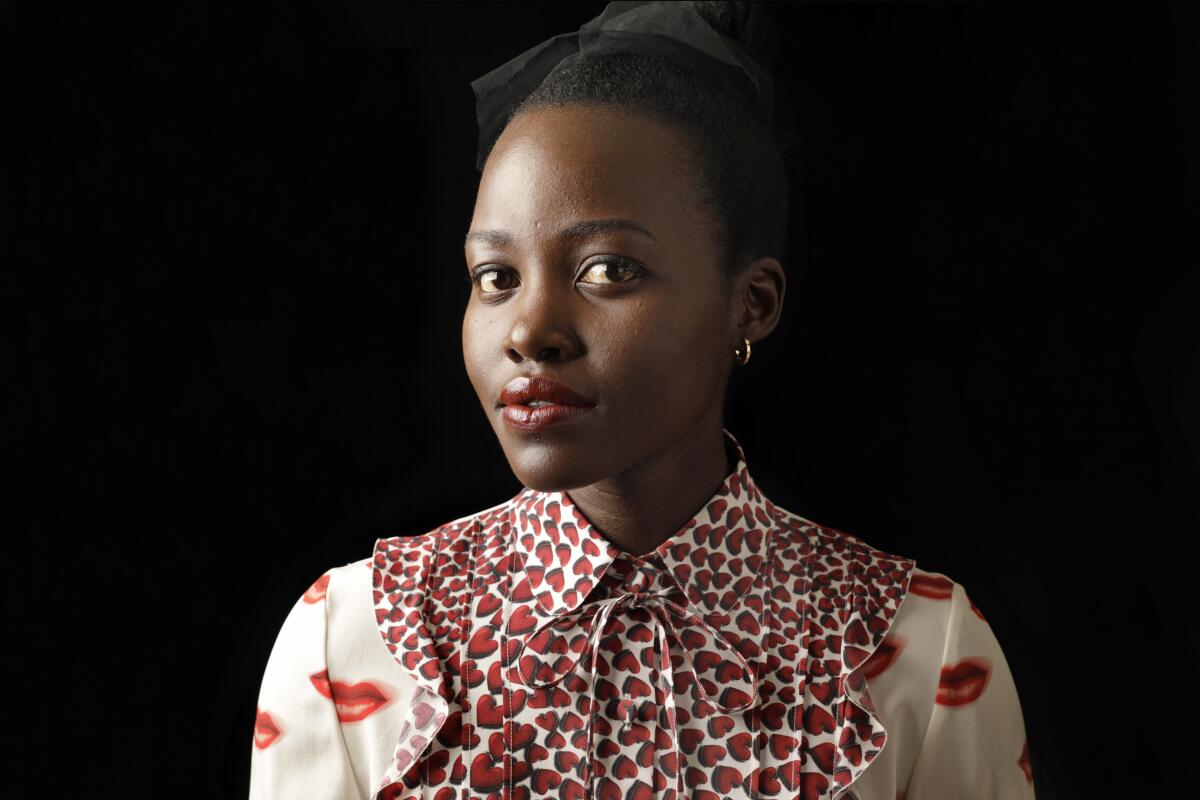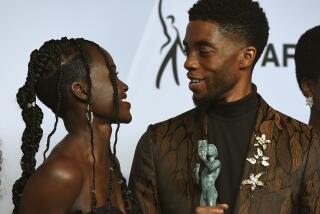Ballet helped Lupita Nyong’o unlock the mysteries of Jordan Peele’s ‘Us’

Lupita Nyong’o lives in a world of yes. In the six years since she first appeared on film, she has traveled from ingénue to powerhouse, with the ability to greenlight productions. That first appearance was indelible: Portraying the tortured Patsey in “12 Years a Slave,” she won an Oscar.
The role stays with her still. “Patsey just got into my marrow,” Nyong’o says, sitting in a hotel suite between photo shoots, red heels kicked to the side. “I will always have a very emotional, internal relationship with that period of time, and I like that; I like that I understand the cost of living in America. We are all beneficiaries of that dark time.”
Playing Nakia, Wakandan spy and T’Challa’s love interest, in “Black Panther” lingers as well, for very different reasons. “I loved being able to bring that world to life, and to address certain social, political issues that are very real and very difficult. To be able to open and even popularize those conversations was really important. It’s a start. A very cool start. And that’s that world: It’s so cool, so fresh, but also I like that it’s so respectful of African history.”
By contrast, her double roles in this spring’s horror film “Us” did not remain with her afterward, “because they were each the antidote for the other. By the end, I was ready to leave. I had explored it all.” Jordan Peele’s film centers on Adelaide, a woman with a painful past, trying to protect her family from Red, her shadow doppelgänger doomed to living in a hellish underworld until the fateful day she breaks free.
If you were among the scores of moviegoers who helped push “Us” to a record-breaking $71.1 million debut over the weekend, then now you know: The real villains in Jordan Peele’s smash horror hit aren’t quite who — or what — they seem.
Nyong’o worked tirelessly to create the two characters’ separate yet linked characters, down to their every move. Adelaide was trying to fit in but not quite making it, “so I always tried to have her a little twisted in her body. She doesn’t reveal everything, so she’s always a little crossed.” Red, meanwhile, had nothing to hide. “There’s something surreal about her, so I chose to approach her with a more stylized performance sensibility,” using a dessicated voice and creepy movements that came from two words Peele had used to describe Red: regal, cockroach. “She’s still until she’s not, and you don’t know which direction she’s going to go. So she moves forward and diagonally but always in lines,” she points out.
Both characters share a history of ballet, so the actress took ballet lessons to understand how they would carry themselves. “Ballerinas are working on minute movements for long periods of time, and there is a discipline and a relationship with the body that’s so precise, and that was very important to me for Red.”
Discipline was necessary to create two roles that had to play off each other, when she had actually nothing to play off of but a green screen. “I had to work with these two characters with a technical precision like I’d never done before, because I was responsible for two lives, and they were diametrically opposed to each other. They had to be both familiar to each other but also distinct.”
Shifting moods, she also stars this year in a light romp called “Little Monsters,” airing on Hulu. She plays Miss Caroline, a sunny kindergarten teacher tasked with protecting her charges during an outing gone very awry. (See: zombies.) She calls the role “my Fräulein Maria.”
The script, written by director Abe Forsythe, made her laugh out loud. “I thought this is absurd, ridiculous, stupid and so much fun. I loved it. It changed the narrative for me. I’d never gotten to do a role like that.”
When the production wanted the rights for Taylor Swift’s “Shake it Off,” the actress wrote the singer to ask permission, and it was bestowed. She sings the song — beautifully, of course — while accompanying herself on the ukulele, which she taught herself to play.
Now in the position to develop her own projects, she is producing and starring in the HBO limited series “Americanah,” based on the novel by Chimamanda Ngozi Adichie. Playwright and “Black Panther” costar Danai Gurira is adapting the work. Nyong’o also asked for, and received, Trevor Noah’s blessing to play his mother in the adaptation of his memoir, “Born a Crime,” which she is producing.
Nyong’o came to fame in Hollywood when roles for black actresses, particularly those with dark skin, were, as they still are, too rare. She has fought against that bias, talking about the effect colorism had on her growing up in Kenya in a now-famous speech for Essence magazine in 2014, and writing about it in her bestselling children’s book, “Sulwe.”
Flooded with requests to turn the speech into a children’s story, she thought that would make for dull reading. It wasn’t until she was working on “Black Panther” that an idea for the story came to her. “I saw what you can do when you make something fantastical and aspirational and imaginative, while still tapping some very tough issues,” she says. “So I realized, this is the gateway for me to tackle colorism for a young generation.”
Nyong’o brings that intelligence and vulnerability to all her work. After all, “Your pain is your wound or your weapon,” she says. “I wanted to make it my weapon.”
More to Read
Only good movies
Get the Indie Focus newsletter, Mark Olsen's weekly guide to the world of cinema.
You may occasionally receive promotional content from the Los Angeles Times.










